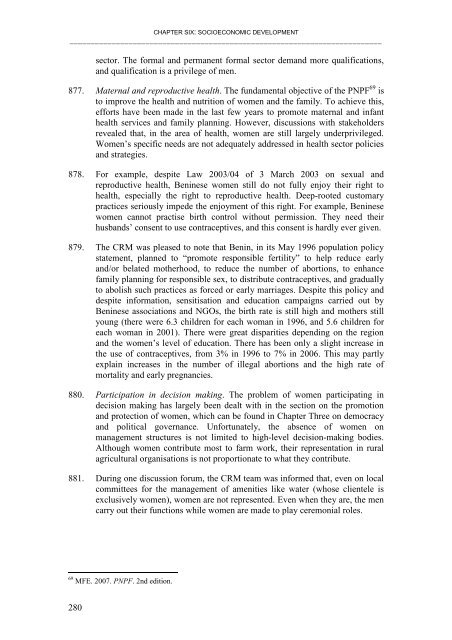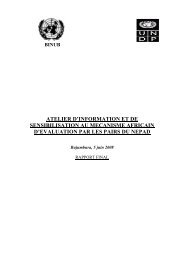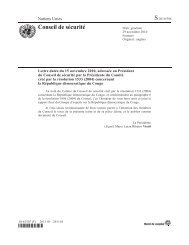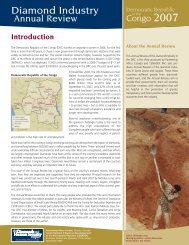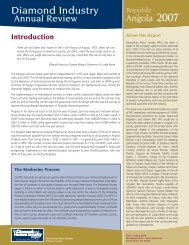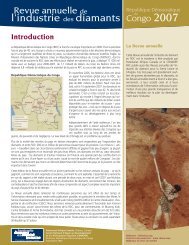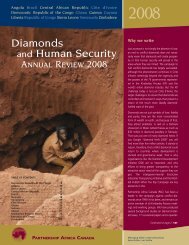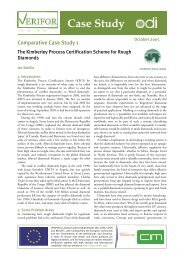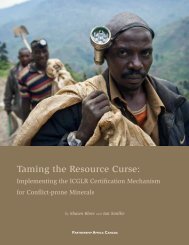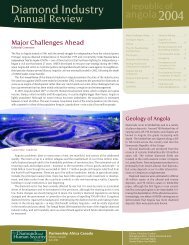- Page 5:
Finally, the APR Panel would like t
- Page 9 and 10:
of democracy, tolerance and fair pl
- Page 11 and 12:
COUNTRY FACT SHEETLocation:West Afr
- Page 13 and 14:
SOME ECONOMIC AND FINANCIAL INDICAT
- Page 15 and 16:
Prospects for economic growth in me
- Page 17 and 18:
CSARCSRDCREDEPOLIPODFIDGIDDIVIDNMPE
- Page 19 and 20:
SONAPRASONEBSPTSTASTAGSTARSYSCOASYS
- Page 21 and 22:
EXECUTIVE SUMMARY__________________
- Page 23 and 24:
EXECUTIVE SUMMARY__________________
- Page 25 and 26:
EXECUTIVE SUMMARY__________________
- Page 27 and 28:
EXECUTIVE SUMMARY__________________
- Page 29 and 30:
EXECUTIVE SUMMARY__________________
- Page 31 and 32:
EXECUTIVE SUMMARY__________________
- Page 33:
EXECUTIVE SUMMARY__________________
- Page 36 and 37:
EXECUTIVE SUMMARY__________________
- Page 38 and 39:
EXECUTIVE SUMMARY__________________
- Page 40 and 41:
EXECUTIVE SUMMARY__________________
- Page 42 and 43:
EXECUTIVE SUMMARY__________________
- Page 44 and 45:
EXECUTIVE SUMMARY__________________
- Page 46 and 47:
EXECUTIVE SUMMARY__________________
- Page 48 and 49:
EXECUTIVE SUMMARY__________________
- Page 50 and 51:
EXECUTIVE SUMMARY__________________
- Page 52 and 53:
CHAPTER ONE: INTRODUCTION: THE APRM
- Page 54 and 55:
CHAPTER ONE: INTRODUCTION: THE APRM
- Page 56 and 57:
CHAPTER ONE: INTRODUCTION: THE APRM
- Page 58 and 59:
CHAPTER ONE: INTRODUCTION: THE APRM
- Page 60 and 61:
CHAPTER ONE: INTRODUCTION: THE APRM
- Page 62 and 63:
CHAPTER ONE: INTRODUCTION: THE APRM
- Page 64 and 65:
CHAPTER TWO: HISTORICAL CONTEXT AND
- Page 66 and 67:
CHAPTER TWO: HISTORICAL CONTEXT AND
- Page 68 and 69:
CHAPTER TWO: HISTORICAL CONTEXT AND
- Page 70 and 71:
CHAPTER TWO: HISTORICAL CONTEXT AND
- Page 72 and 73:
CHAPTER TWO: HISTORICAL CONTEXT AND
- Page 74 and 75:
CHAPTER TWO: HISTORICAL CONTEXT AND
- Page 76 and 77:
CHAPTER TWO: HISTORICAL CONTEXT AND
- Page 78 and 79:
CHAPTER THREE: DEMOCRACY AND POLITI
- Page 80 and 81:
CHAPTER THREE: DEMOCRACY AND POLITI
- Page 82 and 83:
CHAPTER THREE: DEMOCRACY AND POLITI
- Page 84 and 85:
CHAPTER THREE: DEMOCRACY AND POLITI
- Page 86 and 87:
CHAPTER THREE: DEMOCRACY AND POLITI
- Page 88 and 89:
CHAPTER THREE: DEMOCRACY AND POLITI
- Page 90 and 91:
CHAPTER THREE: DEMOCRACY AND POLITI
- Page 92 and 93:
CHAPTER THREE: DEMOCRACY AND POLITI
- Page 94 and 95:
CHAPTER THREE: DEMOCRACY AND POLITI
- Page 96 and 97:
CHAPTER THREE: DEMOCRACY AND POLITI
- Page 98 and 99:
CHAPTER THREE: DEMOCRACY AND POLITI
- Page 100 and 101:
CHAPTER THREE: DEMOCRACY AND POLITI
- Page 102 and 103:
CHAPTER THREE: DEMOCRACY AND POLITI
- Page 104 and 105:
CHAPTER THREE: DEMOCRACY AND POLITI
- Page 106 and 107:
CHAPTER THREE: DEMOCRACY AND POLITI
- Page 108 and 109:
CHAPTER THREE: DEMOCRACY AND POLITI
- Page 110 and 111:
CHAPTER THREE: DEMOCRACY AND POLITI
- Page 112 and 113:
CHAPTER THREE: DEMOCRACY AND POLITI
- Page 114 and 115:
CHAPTER THREE: DEMOCRACY AND POLITI
- Page 116 and 117:
CHAPTER THREE: DEMOCRACY AND POLITI
- Page 118 and 119:
CHAPTER THREE: DEMOCRACY AND POLITI
- Page 120 and 121:
CHAPTER THREE: DEMOCRACY AND POLITI
- Page 122 and 123:
CHAPTER THREE: DEMOCRACY AND POLITI
- Page 124 and 125:
CHAPTER THREE: DEMOCRACY AND POLITI
- Page 126 and 127:
CHAPTER THREE: DEMOCRACY AND POLITI
- Page 128 and 129:
CHAPTER THREE: DEMOCRACY AND POLITI
- Page 130 and 131:
CHAPTER THREE: DEMOCRACY AND POLITI
- Page 132 and 133:
CHAPTER THREE: DEMOCRACY AND POLITI
- Page 134 and 135:
CHAPTER THREE: DEMOCRACY AND POLITI
- Page 136 and 137:
CHAPTER THREE: DEMOCRACY AND POLITI
- Page 138 and 139:
CHAPTER THREE: DEMOCRACY AND POLITI
- Page 140 and 141:
CHAPTER THREE: DEMOCRACY AND POLITI
- Page 142 and 143:
CHAPTER THREE: DEMOCRACY AND POLITI
- Page 144 and 145:
CHAPTER THREE: DEMOCRACY AND POLITI
- Page 146 and 147:
CHAPTER THREE: DEMOCRACY AND POLITI
- Page 148 and 149:
CHAPTER THREE: DEMOCRACY AND POLITI
- Page 150 and 151:
CHAPTER FOUR: ECONOMIC GOVERNANCE A
- Page 152 and 153:
CHAPTER FOUR: ECONOMIC GOVERNANCE A
- Page 154 and 155:
CHAPTER FOUR: ECONOMIC GOVERNANCE A
- Page 156 and 157:
CHAPTER FOUR: ECONOMIC GOVERNANCE A
- Page 158 and 159:
CHAPTER FOUR: ECONOMIC GOVERNANCE A
- Page 160 and 161:
CHAPTER FOUR: ECONOMIC GOVERNANCE A
- Page 162 and 163:
CHAPTER FOUR: ECONOMIC GOVERNANCE A
- Page 164 and 165:
CHAPTER FOUR: ECONOMIC GOVERNANCE A
- Page 166 and 167:
CHAPTER FOUR: ECONOMIC GOVERNANCE A
- Page 168 and 169:
CHAPTER FOUR: ECONOMIC GOVERNANCE A
- Page 170 and 171:
CHAPTER FOUR: ECONOMIC GOVERNANCE A
- Page 172 and 173:
CHAPTER FOUR: ECONOMIC GOVERNANCE A
- Page 174 and 175:
CHAPTER FOUR: ECONOMIC GOVERNANCE A
- Page 176 and 177:
CHAPTER FOUR: ECONOMIC GOVERNANCE A
- Page 178 and 179:
CHAPTER FOUR: ECONOMIC GOVERNANCE A
- Page 180 and 181:
CHAPTER FOUR: ECONOMIC GOVERNANCE A
- Page 182 and 183:
CHAPTER FOUR: ECONOMIC GOVERNANCE A
- Page 184 and 185:
CHAPTER FOUR: ECONOMIC GOVERNANCE A
- Page 186 and 187:
CHAPTER FOUR: ECONOMIC GOVERNANCE A
- Page 188 and 189:
CHAPTER FOUR: ECONOMIC GOVERNANCE A
- Page 190 and 191:
CHAPTER FOUR: ECONOMIC GOVERNANCE A
- Page 192 and 193:
CHAPTER FOUR: ECONOMIC GOVERNANCE A
- Page 194 and 195:
CHAPTER FOUR: ECONOMIC GOVERNANCE A
- Page 196 and 197:
CHAPTER FOUR: ECONOMIC GOVERNANCE A
- Page 198 and 199:
CHAPTER FOUR: ECONOMIC GOVERNANCE A
- Page 200 and 201:
CHAPTER FOUR: ECONOMIC GOVERNANCE A
- Page 202 and 203:
CHAPTER FIVE: CORPORATE GOVERNANCE_
- Page 204 and 205:
CHAPTER FIVE: CORPORATE GOVERNANCE_
- Page 206 and 207:
CHAPTER FIVE: CORPORATE GOVERNANCE_
- Page 208 and 209:
CHAPTER FIVE: CORPORATE GOVERNANCE_
- Page 210 and 211:
CHAPTER FIVE: CORPORATE GOVERNANCE_
- Page 212 and 213:
CHAPTER FIVE: CORPORATE GOVERNANCE_
- Page 214 and 215:
CHAPTER FIVE: CORPORATE GOVERNANCE_
- Page 216 and 217:
CHAPTER FIVE: CORPORATE GOVERNANCE_
- Page 218 and 219:
CHAPTER FIVE: CORPORATE GOVERNANCE_
- Page 220 and 221:
CHAPTER FIVE: CORPORATE GOVERNANCE_
- Page 222 and 223:
CHAPTER FIVE: CORPORATE GOVERNANCE_
- Page 224 and 225:
CHAPTER FIVE: CORPORATE GOVERNANCE_
- Page 226 and 227:
CHAPTER FIVE: CORPORATE GOVERNANCE_
- Page 228 and 229:
CHAPTER FIVE: CORPORATE GOVERNANCE_
- Page 230 and 231:
CHAPTER FIVE: CORPORATE GOVERNANCE_
- Page 232 and 233:
CHAPTER FIVE: CORPORATE GOVERNANCE_
- Page 234 and 235:
CHAPTER FIVE: CORPORATE GOVERNANCE_
- Page 236 and 237:
CHAPTER FIVE: CORPORATE GOVERNANCE_
- Page 238 and 239:
CHAPTER FIVE: CORPORATE GOVERNANCE_
- Page 240 and 241:
CHAPTER FIVE: CORPORATE GOVERNANCE_
- Page 242 and 243:
CHAPTER FIVE: CORPORATE GOVERNANCE_
- Page 244 and 245:
CHAPTER FIVE: CORPORATE GOVERNANCE_
- Page 246 and 247:
CHAPTER FIVE: CORPORATE GOVERNANCE_
- Page 248 and 249:
CHAPTER FIVE: CORPORATE GOVERNANCE_
- Page 250 and 251: CHAPTER FIVE: CORPORATE GOVERNANCE_
- Page 252 and 253: CHAPTER FIVE: CORPORATE GOVERNANCE_
- Page 254 and 255: CHAPTER FIVE: CORPORATE GOVERNANCE_
- Page 256 and 257: CHAPTER FIVE: CORPORATE GOVERNANCE_
- Page 258 and 259: CHAPTER FIVE: CORPORATE GOVERNANCE_
- Page 260 and 261: CHAPTER FIVE: CORPORATE GOVERNANCE_
- Page 262 and 263: CHAPTER FIVE: CORPORATE GOVERNANCE_
- Page 264 and 265: CHAPTER SIX: SOCIOECONOMIC DEVELOPM
- Page 266 and 267: CHAPTER SIX: SOCIOECONOMIC DEVELOPM
- Page 268 and 269: CHAPTER SIX: SOCIOECONOMIC DEVELOPM
- Page 270 and 271: CHAPTER SIX: SOCIOECONOMIC DEVELOPM
- Page 272 and 273: CHAPTER SIX: SOCIOECONOMIC DEVELOPM
- Page 274 and 275: CHAPTER SIX: SOCIOECONOMIC DEVELOPM
- Page 276 and 277: CHAPTER SIX: SOCIOECONOMIC DEVELOPM
- Page 278 and 279: CHAPTER SIX: SOCIOECONOMIC DEVELOPM
- Page 280 and 281: CHAPTER SIX: SOCIOECONOMIC DEVELOPM
- Page 282 and 283: CHAPTER SIX: SOCIOECONOMIC DEVELOPM
- Page 284 and 285: CHAPTER SIX: SOCIOECONOMIC DEVELOPM
- Page 286 and 287: CHAPTER SIX: SOCIOECONOMIC DEVELOPM
- Page 288 and 289: CHAPTER SIX: SOCIOECONOMIC DEVELOPM
- Page 290 and 291: CHAPTER SIX: SOCIOECONOMIC DEVELOPM
- Page 292 and 293: CHAPTER SIX: SOCIOECONOMIC DEVELOPM
- Page 294 and 295: CHAPTER SIX: SOCIOECONOMIC DEVELOPM
- Page 296 and 297: CHAPTER SIX: SOCIOECONOMIC DEVELOPM
- Page 298 and 299: CHAPTER SIX: SOCIOECONOMIC DEVELOPM
- Page 302 and 303: CHAPTER SIX: SOCIOECONOMIC DEVELOPM
- Page 304 and 305: CHAPTER SIX: SOCIOECONOMIC DEVELOPM
- Page 306 and 307: CHAPTER SIX: SOCIOECONOMIC DEVELOPM
- Page 308 and 309: CHAPTER SEVEN: CROSSCUTTING ISSUES_
- Page 310 and 311: CHAPTER SEVEN: CROSSCUTTING ISSUES_
- Page 312 and 313: CHAPTER SEVEN: CROSSCUTTING ISSUES_
- Page 314 and 315: CHAPTER SEVEN: CROSSCUTTING ISSUES_
- Page 316 and 317: CHAPTER SEVEN: CROSSCUTTING ISSUES_
- Page 318 and 319: CHAPTER SEVEN: CROSSCUTTING ISSUES_
- Page 320 and 321: CHAPTER SEVEN: CROSSCUTTING ISSUES_
- Page 322 and 323: CHAPTER SEVEN: CROSSCUTTING ISSUES_
- Page 324 and 325: CHAPTER SEVEN: CROSSCUTTING ISSUES_
- Page 326 and 327: CHAPTER SEVEN: CROSSCUTTING ISSUES_
- Page 328 and 329: CHAPTER EIGHT: GENERAL CONCLUSIONS:
- Page 330 and 331: CHAPTER EIGHT: GENERAL CONCLUSIONS:
- Page 332 and 333: APPENDIX I: PROGRAMME OF ACTION OF
- Page 334 and 335: APPENDIX I: PROGRAMME OF ACTION OF
- Page 336 and 337: APPENDIX I: PROGRAMME OF ACTION OF
- Page 338 and 339: APPENDIX I: PROGRAMME OF ACTION OF
- Page 340 and 341: APPENDIX I: PROGRAMME OF ACTION OF
- Page 342 and 343: APPENDIX I: PROGRAMME OF ACTION OF
- Page 344 and 345: APPENDIX I: PROGRAMME OF ACTION OF
- Page 346 and 347: APPENDIX I: PROGRAMME OF ACTION OF
- Page 348 and 349: APPENDIX I: PROGRAMME OF ACTION OF
- Page 350 and 351:
APPENDIX I: PROGRAMME OF ACTION OF
- Page 352 and 353:
APPENDIX I: PROGRAMME OF ACTION OF
- Page 354 and 355:
APPENDIX I: PROGRAMME OF ACTION OF
- Page 356 and 357:
APPENDIX I: PROGRAMME OF ACTION OF
- Page 358 and 359:
APPENDIX I: PROGRAMME OF ACTION OF
- Page 360 and 361:
APPENDIX I: PROGRAMME OF ACTION OF
- Page 362 and 363:
APPENDIX I: PROGRAMME OF ACTION OF
- Page 364 and 365:
APPENDIX I: PROGRAMME OF ACTION OF
- Page 366 and 367:
APPENDIX I: PROGRAMME OF ACTION OF
- Page 368 and 369:
APPENDIX I: PROGRAMME OF ACTION OF
- Page 370 and 371:
APPENDIX I: PROGRAMME OF ACTION OF
- Page 372 and 373:
APPENDIX I: PROGRAMME OF ACTION OF
- Page 374 and 375:
APPENDIX I: PROGRAMME OF ACTION OF
- Page 376 and 377:
APPENDIX I: PROGRAMME OF ACTION OF
- Page 378 and 379:
APPENDIX I: PROGRAMME OF ACTION OF
- Page 380 and 381:
APPENDIX I: PROGRAMME OF ACTION OF
- Page 382 and 383:
APPENDIX I: PROGRAMME OF ACTION OF
- Page 384 and 385:
APPENDIX I: PROGRAMME OF ACTION OF
- Page 386 and 387:
APPENDIX I: PROGRAMME OF ACTION OF
- Page 388 and 389:
APPENDIX I: PROGRAMME OF ACTION OF
- Page 390 and 391:
APPENDIX I: PROGRAMME OF ACTION OF
- Page 392 and 393:
APPENDIX I: PROGRAMME OF ACTION OF
- Page 394 and 395:
APPENDIX I: PROGRAMME OF ACTION OF
- Page 396 and 397:
APPENDIX I: PROGRAMME OF ACTION OF
- Page 398 and 399:
APPENDIX I: PROGRAMME OF ACTION OF
- Page 400 and 401:
APPENDIX I: PROGRAMME OF ACTION OF
- Page 402 and 403:
APPENDIX I: PROGRAMME OF ACTION OF
- Page 404 and 405:
APPENDIX I: PROGRAMME OF ACTION OF
- Page 406 and 407:
APPENDIX I: PROGRAMME OF ACTION OF
- Page 408 and 409:
APPENDIX II: BENINESE GOVERNMENT CO
- Page 410 and 411:
APPENDIX II: BENINESE GOVERNMENT CO
- Page 412 and 413:
APPENDIX II: BENINESE GOVERNMENT CO
- Page 414 and 415:
APPENDIX II: BENINESE GOVERNMENT CO
- Page 416 and 417:
APPENDIX II: BENINESE GOVERNMENT CO
- Page 418 and 419:
APPENDIX II: BENINESE GOVERNMENT CO
- Page 420 and 421:
APPENDIX II: BENINESE GOVERNMENT CO
- Page 422 and 423:
APPENDIX III: REPORT ON THE PEER RE
- Page 424 and 425:
APPENDIX III: REPORT ON THE PEER RE
- Page 426 and 427:
APPENDIX III: REPORT ON THE PEER RE
- Page 428 and 429:
APPENDIX III: REPORT ON THE PEER RE
- Page 430 and 431:
APPENDIX III: REPORT ON THE PEER RE
- Page 432 and 433:
APPENDIX III: REPORT ON THE PEER RE
- Page 434:
APPENDIX III: REPORT ON THE PEER RE


